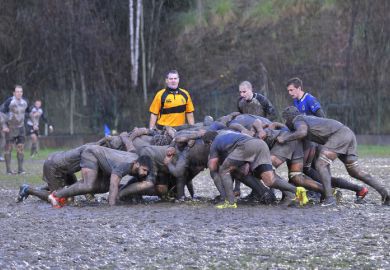The Russell Group was right to insist, in the wake of the UK government’s recent Post-16 Education and White Paper, that humanities graduates have an important role to play in fulfilling the industrial strategy.
In an article in Times Higher Education, the group’s policy manager, Charlotte Hallahan, reported analysis revealing that 85 per cent of non-STEM graduates from high-tariff, research-intensive universities enter one of the government’s eight priority sectors for growth within five years of completing their first degrees. As she noted, even high tech start-ups “not only need the scientists or engineers who make the technical breakthroughs, but a whole range of legal, creative, strategic and critical thinking skills – which SHAPE education provides.”
But as human-machine synergies accelerate discovery, product development and social change, wouldn’t it be better to have graduates whose expertise spanned both STEM and SHAPE disciplines? AI and other digital systems are set to move from being mere tools to joining us as co-creators, analysts and even decision partners. This raises the stakes when it comes to ethical and security implications. The speed at which biosynthetic development takes place has created concerns about biosafety, for instance.
The more of ourselves we put into technological systems, the more exposed we become – cybercrime, for instance, costs the UK economy in excess of £30 billion a year. Having the technological knowledge is valuable but needs to be coupled with critical thinking and wider social and ethical framing.
Multinational corporations such as Google have already begun to respond to these developments, launching in July a US-wide initiative to train workers and small businesses in AI. However, universities have the opportunity to prioritise wider talent creation, which will still serve business, innovation and the economy.
Such a workforce will also be more future-proof and responsive because the accelerated pace of technological change is also likely to increase the rate at which skills, especially individual specialisms, become outdated. Modern graduates need multiple strings to their bows.
STEAM is the purposeful integration of science, technology, engineering, the arts and humanities and mathematics (I hold the view that the A stands for both arts and humanities). This is no mere fad but a very real and necessary evolution in how we understand and shape knowledge and, as a consequence, the creative and cultural industries.
By embedding interdisciplinary opportunities into degree pathways, students can move fluidly between analytical and imaginative modes of thinking, a skill set increasingly demanded by employers across sectors. Equipping them with wide-ranging knowledge and multiple skills – while also demonstrating the relationship between different disciplines – can spark new understanding and solutions to problems by helping them ask critical questions, consider ethical implications and bring meaning and context to innovation.
For example, in their degree, and then in the job market, an engineering student requires critical thinking more than ever. And an arts student now needs high levels of digital competence. The boundaries between disciplines have become increasingly porous.
My new role as the UK’s first pro vice-chancellor for STEAM is therefore not about symbolic advocacy. It is about systemically embedding and reimagining the way STEAM is woven into traditional education.
At Birmingham City University, students from all disciplines are already being exposed to both STEM and the arts and humanities. But we will go further. We are reviewing and revising the entire curriculum across the university so that every undergraduate degree includes a first-year module with a learning outcome that revolves around defining the basic principles of STEAM. Moreover, every student will complete at least one assignment that requires them to solve challenges in a directly interdisciplinary way.
And rather than offering optional modules outside their discipline, as is common across the sector, the second year will see students enrolled on a cross-departmental collaborative module that embeds STEAM principles in their subject area. What’s more, no matter their degree, all students will be able to apply for a new venture capital fund supporting innovation and enterprise that bridges fields.
The aim of these steps is to equip students with technical expertise, creative confidence and the ability to see and think critically. Industry is no longer asking for graduates who can simply code or calculate: employees need to collaborate across disciplines, communicate complex ideas and adapt to volatile and shifting contexts. These are competencies deeply rooted in the arts and humanities. So, too, is imagination, which is essential for entrepreneurship that is both commercially viable and socially conscious.
The transformative potential of STEAM is perhaps most evident in the realm of AI. Far from being just a technical tool for STEM, AI is also a cultural phenomenon. As we introduce students to the possibilities it affords, we must ground their learning in ethical reasoning, human-centred design and societal impact by drawing on the arts and humanities – not least cultural studies and philosophy.
By making these connections visible and actionable through real-world projects, innovation labs and interdisciplinary teaching, we can create a more sustainable workforce that can transform society for the better.
Hanifa Shah is pro vice-chancellor for research, enterprise, engagement and STEAM at Birmingham City University.
Register to continue
Why register?
- Registration is free and only takes a moment
- Once registered, you can read 3 articles a month
- Sign up for our newsletter
Subscribe
Or subscribe for unlimited access to:
- Unlimited access to news, views, insights & reviews
- Digital editions
- Digital access to THE’s university and college rankings analysis
Already registered or a current subscriber?








